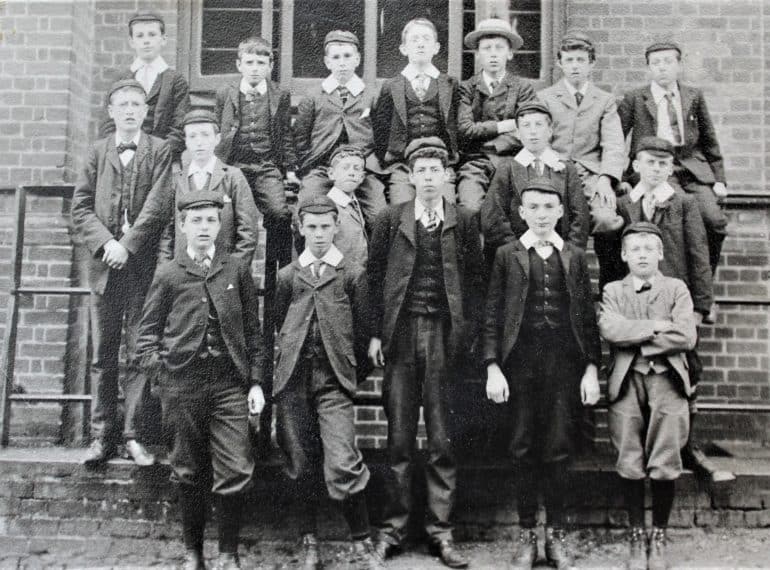
Eighty-nine people joined a special Zoom event held to present QE Collections – Queen Elizabeth’s School’s new fully digitised online set of archives relating to the School and the Barnet area.
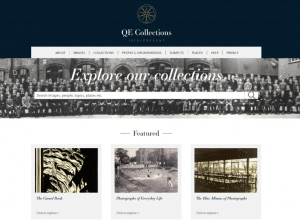 Guests at the public evening ‘town hall’ event, including Old Elizabethans and others with an interest in local history, were given a virtual guided tour and shown how to get the best out of the extensive high-quality online assets spanning more than four centuries.
Guests at the public evening ‘town hall’ event, including Old Elizabethans and others with an interest in local history, were given a virtual guided tour and shown how to get the best out of the extensive high-quality online assets spanning more than four centuries.
Headmaster Neil Enright and QE’s Curator of Collections Surya Bowyer (OE 2007–2014) explained that the School held a variety of historic material and was keen to make it accessible to everyone. QE Collections is therefore offered online free-of-charge for all to enjoy.
In his address to the guests, Mr Enright pointed out that QE has been part of the Barnet community ever since its foundation by royal charter in 1573. “QE Collections therefore includes three different sorts of histories, nevertheless intertwined. These are the history of the School itself; the history of the local area, as viewed through the lens of the School; and the shared social histories that connect us.
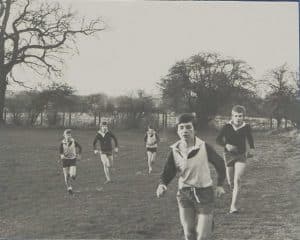 “I am very excited that we are now able to share QE Collections with a wider audience.”
“I am very excited that we are now able to share QE Collections with a wider audience.”
He paid tribute to the key role played by the late Richard Newton (OE 1956–1964), who promoted digitising the School’s archives and making them freely available to all, and also provided generous funding.
“It is certain that without his support, we would not have been able to launch this project – one that will be part of his legacy to the Elizabethan community,” Mr Enright said.
Mr Bowyer, who has played a central role in developing the platform and curating the material uploaded so far, pointed the guests towards a number of current highlights of QE Collections:
- A copy of Frederick Charles Cass’s book on the history of the School’s first century, which was published in around 1881
- The collection of S E ‘Olly’ and Mary Alford, both school staff members, featuring scrapbooks from 1958 to 1975
- A mid-20th century illustrated notebook by an anonymous author featuring two narratives, ‘Spend your holiday at a farm camp’ and ‘A Day At A Harvest Camp’
- School magazines and periodicals from 1876–1984
- The Guard Book, a large scrapbook of ephemeral items related to activities at the School from 1913 to 1970, compiled by E H Jenkins (Headmaster 1930–1961).
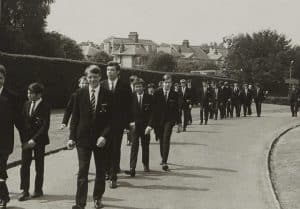 “We are constantly putting new material online, so the highlights would be different if I did this event in a few months’ time, or even next month,” Mr Bowyer added.
“We are constantly putting new material online, so the highlights would be different if I did this event in a few months’ time, or even next month,” Mr Bowyer added.
The event included tips and tricks for getting the best out of QE Collections, together with an explanation of how the various collections are organised, with ‘access points’ provided for the digitised objects – for example: People & Organisations; Subjects; Places.
All printed text in digitised objects is almost invariably fully searchable. Anyone wishing to search for a full name or phrase should put it in double speech marks in the search box, Mr Bowyer said.
Work continues on making archival material online. “Among several exciting projects that are currently mid-digitisation are the QE Governors’ minute books going all the way back to the earliest we have in 1587. The first is available now, with more coming soon.
“There is also our 20th Century History Project, which recreates life at the School during the last century through photographs, written records and ephemera. Lots of material from the 1940s to 1980s is already available and, again, more is coming soon.”
QE Collections was given a ‘soft launch’ three months ago. Since then, there have been more than 1,300 users from over 35 countries, with the Group Photographs and Everyday Life (Photographs) collections proving the most popular so far.
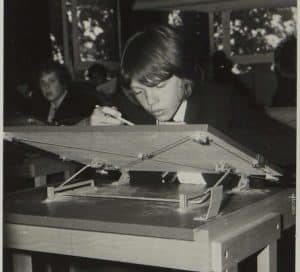 QE Collections uses professional digitisers to ensure its digitised files are of very high quality and has employed an industry-standard digital preservation system to ensure long-term availability for these digitised files, Mr Bowyer said, adding that while digital files are excellent for improving access, they are harder to preserve than physical objects, as digital storage media can become obsolete and data can become corrupted.
QE Collections uses professional digitisers to ensure its digitised files are of very high quality and has employed an industry-standard digital preservation system to ensure long-term availability for these digitised files, Mr Bowyer said, adding that while digital files are excellent for improving access, they are harder to preserve than physical objects, as digital storage media can become obsolete and data can become corrupted.
“All this work takes a lot of time and costs a lot of money. If you like the work we are doing and are in a position where you can consider supporting this work, please consider contributing to our Digital Fund, which supports QE Collections.”
